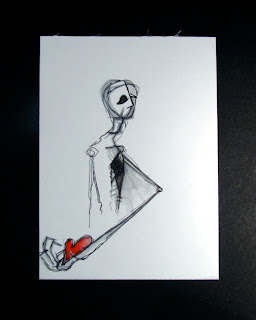6.22.2009
stay.really.

I am not yours, not lost in you, You love me, and I find you still Oh plunge me deep in love, put out Sara Teasdale, American Lyrical Poet (1884-1933)
Not lost, although I long to be
Lost as a candle lit at noon,
Lost as a snowflake in the sea.
A spirit beautiful and bright,
Yet I am I, who long to be
Lost as a light is lost in light.
My senses, leave me deaf and blind,
Swept by the tempest of your love,
A taper in a rushing wind.
oh.myheart.

More Beethoven, if you'd like -- two sonatas I've enjoyed sightreading (maybe not quite at tempo...)
Sonata No. 27, Op. 90,
I. Mit Lebhaftigkeit und durchaus mit Empfindung und Ausdruck (With liveliness and with feeling and expression throughout)
Sonata No. 32, Op. 111,
I. Maestoso
sigh.

I am free of love as a bird flying south in the autumn, I am free of love, and I listen to music lightly,
Swift and intent, asking no joy from another,
Glad to forget all of the passion of April
Ere it was love-free.
But if he returned, if he should look at me deeply,
I should awake, I should awake and remember
I am my lover’s.
Sara Teasdale, American Lyrical Poet (1884-1933)
6.21.2009
suffering
"We are tempted to try to avoid not only our own suffering but also that of our fellow human beings, the suffering of the world, which is part of our own suffering. ...The artist cannot hold back; it is impossible, because writing, or any other discipline of art, involves participation in suffering, in the ills and the occasional stabbing joys that come from being part of the human drama. We are hurt; we are lonely; and we turn to music or words, and as compensation beyond all price we are given glimpses of the world on the other side of time and space."
Suffering brings depth... affliction gives us a different perspective on life and provides a glimpse into another world, if we choose to allow it. I've been drawn to much of Beethoven's music lately. There is an artist who fully understood suffering -- Beethoven battled with painful inexplicable illness, alienation from normal relationships, a devastating loss of hearing... Yet all of that terrible suffering greatly deepened his compositions. One only needs to compare an early piano sonata (any from Opus 2, for example) with a late piano sonata (Opus 111) to hear the difference. His late piano sonatas are profound and other-worldly. The fifth movement from Beethoven's String Quartet 13 (in B-flat, Opus 130 - Cavatina: Adagio molto espressivo) is an intimate glimpse into Beethoven's personl suffering. Beethoven had been almost completely deaf for 10 years before he wrote Opus 130. He said of this particular movement: "When I think of the Cavatina, it still brings a tear to my eye." Almost 200 years later, Beethoven's composition still brings a tear to my eye - Beethoven addressed universal human suffering when he wrote Cavatina and thus provided a passage into another world.
So. All of this to challenge myself - to not hold back, to participate fully in my own and the world's suffering, to give generously of my art, musings, and heart, to care for other's pain before my own, to just live abundantly in suffering, joy, loneliness, love, heartache, pleasure, and pain.
(2 Corinthians 1:3-7)
6.16.2009
6.12.2009
coming soon...


One reason I haven't painted or posted much lately is because I've been sight reading music voraciously. . . tonight the sudden, gloomy downpour created the perfect mood for a dark Rachmaninov etude -- Op. 39 No. 2, in A minor.
Tragedy, poignancy, heartbreak... the gentle theme speaks to secret pain. Triplets and displaced rhythm emphasize an ethereal, "lost in a mist" feeling... until the più vivo (devilishly difficult section). Subsequently, a shimmer of hope is heard in the brief E major section, but Rachmaninov then fully succumbs to despair, returning to the theme - rendered all the more tragic in contrast to the major section. The etude ends with a lovely dissonance - novel chords for this time. Incredible that a piece written nearly 100 years ago could still speak so intensely.








